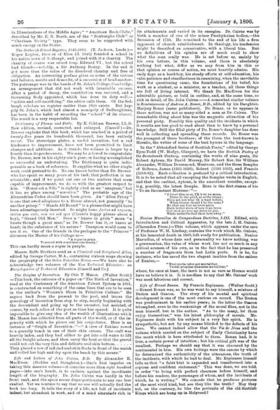Dictionary of Phrase and Fable. By E. Cobham Brewer, LL.D.
New edition, revised, corrected, and enlarged. (Cassell )—Dr. Brewer explains that this book, which has reached in a period of twenty-five years its hundredth thousand, has been entirely recast. The stereotype plates, a useful invention, but a sad hindrance to improvement, have not been permitted to limit changes and additions. As it stands, the volume is larger by a fourth than its predecessors. We may be allowed to congratulate Dr. Brewer, now in his eighty-sixth year, on having accomplished so successful an undertaking. The Dictionary is quite indis- pensable as a book of reference. It supplies what no other single work could pretend to do. No one knows better than Dr. Brewer who has spent so many years at his task, that perfection is un- attainable; and if we point out one or two matters that seem capable of improvement, we do so with the greatest respect to him. "Honor eat a Nile" is rightly cited as an "anagram," but it has no place among " acrostics." The probable age of the Alexandrian Codex should have been given. An "Alien Priory" is one that owed allegiance to a House abroad, not generally "to another priory." "Hands All Round" is a phrase that might have been advantageously inserted. So might home factus ad unguem, status quo ante, non res sad apes (Cicero's happy phrase about a boy), "Grand Old Man." Does a knave in grain" mean "a knave though a great man," as Dr. Brewer has it, or knave at heart, in the substance of his nature ? Tennyson would seem to use it so. One of the friends in the prologue to the " Princess " discusses the Master of his College as— "A rcgue in grain
Vs neered with sinetimonzoue theory."
This can hardly mean a rogue in purple.














































 Previous page
Previous page